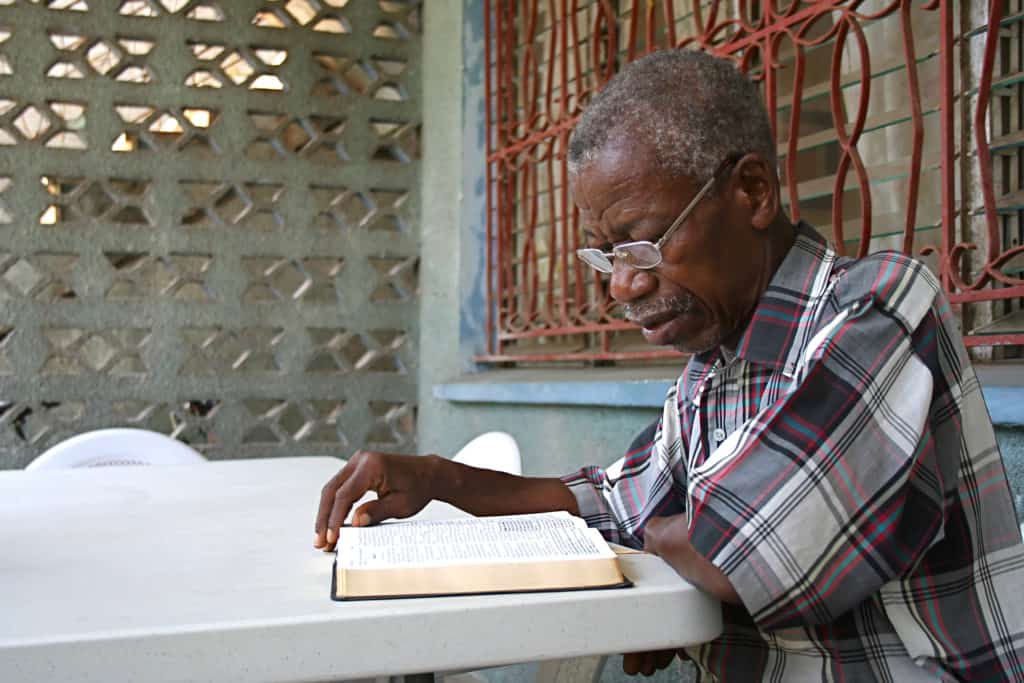
It’s one thing to read the Bible, it’s another to study it. Here’s how to get the most out of your Bible study so you can find freedom, healing and hope in Jesus.
You’ve made the decision—you’re diving in!
The Bible is a unique book. It’s got exciting parts, it’s got boring parts. It’s got weird parts and inspiring parts. It can cut to the heart while also filling you with a new kind of peace. It covers the big picture and also zeroes in on the smallest details that still make a difference. The Bible can affect your life in ways you never thought possible.
“For the word of God is alive and active. Sharper than any double-edged sword, it penetrates even to dividing soul and spirit, joints and marrow; it judges the thoughts and attitudes of the heart” (Hebrews 4:12, NIV).
It might feel intimidating to begin your study—just like how it can feel before having to dig into a new textbook at school or begin a new project at work. What’s different about the Bible, however, is that you can take comfort in the fact that it was written for your own benefit.
“Do not be anxious about anything, but in every situation, by prayer and petition, with thanksgiving, present your requests to God. And the peace of God, which transcends all understanding, will guard your hearts and your minds in Christ Jesus” (Philippians 4:6-7, emphasis added).
“Your word is a lamp for my feet, a light on my path” (Psalm 119:105, NIV).
God wants every single person to get to know Him, experience His love, and understand His will as it’s revealed in the pages of His Word. You can do it. And there are several tools, resources, and even people available to assist you in your journey.
Need some resources to help you get started on your discovery of Bible treasures? Check out our free online Bible study guides.

Reading vs. Studying
Did you know that there’s a difference between reading and studying the Bible? King David, stressed the importance of taking in the words of Scripture with care. Check out this little bit of the second-longest Psalm in the Bible:
How can a young person stay pure? By obeying Your Word. I have tried hard to find You—don’t let me wander from Your commands. I have hidden Your Word in my heart, that I might not sin against You. I praise you, O Lord; teach me your decrees. I have recited aloud all the regulations you have given us. I have rejoiced in your laws as much as in riches. I will study your commandments and reflect on your ways. I will delight in your decrees and not forget your word (Psalm 119:9-16, NLT).
Notice how David includes active ways to regard Scripture. It’s not only for casual reading—it’s to memorize, to meditate upon, to obey. And even to bring us delight as it provides guidance and meaning. The Bible is meant for action.
“All Scripture is inspired by God and is useful to teach us what is true and to make us realize what is wrong in our lives. It corrects us when we are wrong and teaches us to do what is right.” (2 Timothy 3:16, NLT).
Bible Study 101
So where’s the best place to start? What’s the best reading method to use? How much time should you allow?
Before you get caught up in the details, you might be surprised to find that studying the Bible is not as difficult as you may think.
To help get you on your way, here are 7 ways to prepare for an effective Bible study:

1. Start with Prayer!
Pray that God will give you wisdom and understanding of not only what the Bible means, but how it applies.
Prayer is the first step to connecting with God. It seems logical, then, to begin with prayer before you get into Scripture.
Your prayer doesn’t have to be eloquent, complicated, or perfect. Simply ask God to be with you and to give you focus and wisdom.
The best part is, he’s already promised you that He will!
“If you need wisdom, ask our generous God, and he will give it to you. He will not rebuke you for asking. But when you ask him, be sure that your faith is in God alone. Do not waver, for a person with divided loyalty is as unsettled as a wave of the sea that is blown and tossed by the wind. Such people should not expect to receive anything from the Lord. Their loyalty is divided between God and the world, and they are unstable in everything they do” (James 1:5-8, NLT).
Yes, James adds the caution to ask in faith, not wavering with doubt. If this is the first time you pray this prayer, however, be encouraged that your intentional asking is an act of faith. Simply opening up your heart in prayer is an invitation for God to send you His Holy Spirit, which He promises will “guide you into all truth” (John 16:13).
“But when the Father sends the Advocate as my representative—that is, the Holy Spirit—he will teach you everything and will remind you of everything I have told you” (John 14:26).

2. Set a regular time for Bible study, and guard that time.
The Bible promises: “Come near to God, and He will come near to you” (James 4:8, NIV). But we all know how hard it can be to set aside time in our daily lives. Even with the best of intentions, if there isn’t a set-aside time committed to study, it’s a lot more difficult to keep up a consistent program. Find a time that works for you, schedule it on your calendar, and stick to it.
Many have found success with studying the Bible first thing in the morning, before anything else has a chance to be a distraction. But everyone’s different! Pray about it, then be intentional about your time. This kind of study time is often called “devotions” because you’re devoting time to God.
Here are some tips to staying committed with your schedule:
- Start small. Just 10-15 minutes gives you time to pray for the Holy Spirit’s guidance, read a chapter, then prayerfully reflect on what you just read. Over time you may want to increase how long you spend in devotions as you get deeper into the Word.
- Eliminate distractions. It’s so easy to have emails or texts pinging us before we even get out of bed. There’s also the pressure to get started on the to-do list right away. Because of the hyper-connected society most of us live in, it takes effort and commitment just to set boundaries and have quiet time. But it’s worth it.
- Tell others. Let your spouse, parents, siblings, kids, etc., know you need this time to yourself. (That can also help keep you accountable!) Some people also let their friends or coworkers know for that time slot, you won’t be answering emails, texts or calls.

3. Try the “Inductive” Bible study method.
This approach to Bible study is comprised of only three steps:
- Observation: What are these verses saying?
- Interpretation: What do these verses mean?
- Application: What does this passage mean to me?
As you read, first try taking each verse at face value. If that doesn’t seem to fit, look at the chapter you just read as a whole. What is the setting? What is the focus? Who’s talking to whom? Often the answers to these questions can also help you figure out how to apply the underlying principles to your own life.

4. Find a version of the Bible you can understand.
There’s no point in studying the Bible if you can’t understand its basic language. That’s why it’s crucial for you to find a version you are comfortable with. Some recommend actual study Bibles, but keep in mind the Holy Spirit is powerful enough to give you insight and wisdom while using any version of the Bible.
Whichever version you use, it’s important to educate yourself on the different versions available. Test out passages in different versions as see which ones you can best relate to.
Based on research done by the Seventh-day Adventists’ Biblical Research Institute, these 4 versions are recommended for accuracy and readability for the English language:
- New King James Version
- English Standard Version
- Christian Standard Bible
- New American Standard Bible

5. Find quality Bible study tools.
God’s Holy Spirit will give you wisdom and knowledge about what you’re studying, but He doesn’t do the work for you. God knows “doing the work” of Bible study is part of how you internalize what you learn.
There are additional tools to consider, but at a minimum, it’s recommended to have these two resources available as you start your Bible study journey:
A reliable Bible Commentary: A Bible commentary provides input from experts who have studied the history and context surrounding various passages of Scripture that often require further study. Since this is a “man-made” resource, it’s true that expert opinions may vary. But with diligent study, you’ll be able to pick out the patterns and pray for the Holy Spirit’s guidance as you learn more.
Here’s a reliable Commentary to try: https://www.logos.com/product/38875/seventh-day-adventist-bible-commentary-standard-edition
A reliable Bible Concordance:
A Concordance is like an in-depth index to the Bible. It keeps track of where certain names, phrases, and terms were used and lists the verse references for each of them. Concordances come in handy for topical studies, as it helps you find each place in the Bible the topic is addressed.
Try using this concordance: https://www.biblestudytools.com/concordances/strongs-exhaustive-concordance/
Additionally, you can find even more free Bible study tools at: https://www.biblegateway.com/resources/

6. It’s OK to say “I don’t know.”
The Bible is a heavy-duty book about an all-powerful God with infinite perspective. There will likely be passages that are hard to understand, at least at first. Rest assured God understands, and He’s on this journey with you. If you come across a section of the Bible that leaves you befuddled, take notes. Write down your questions, your concerns, even your fears regarding those verses. Then move on—it’s OK!
While much of the Bible complements itself in piecing together its overarching truths, you don’t need to understand every verse right away, as you’re reading through. The Bible isn’t a novel that requires you to understand everything in chapter one in order to make sense of chapter 2. In fact, it’s even recommended to set one story or section aside for further study, then continuing to study the rest. Just remember to come back to it later.
Also, God will answer your prayers for clarity and understanding about your Bible study, even if it takes some time or growth first. Patience pays off in studying the Bible. Clarity may come in a day, in a year, or through an experience. God’s timing is perfect, and He knows the best way you will learn each principle of the Bible.
Consider the prophet and statesman Daniel, while studying a specific prophecy (see Daniel 10:1-21) became anxious, troubled, and confused—but he didn’t give up. Instead, he was consistent and persistent in praying and God gave him the understanding he was searching for.

7. Find a study buddy:
To get the most out of your Bible study, don’t go it alone! Find a trusted friend, pastor, or other person who is as serious and focused about studying the Bible as you are.
Interestingly enough, Jesus, when sending out His disciples to spread the Gospel, sent them out two by two (Mark 6:7 & Luke 10:1). We were created as relational beings, engineered to “motivate one another” and to “not neglect meeting together” but to “encourage one another” (Hebrews 10:24, 25, NLT).
Furthermore, the wise King Solomon wrote about the importance of making sure that you connect with at least one other person:
“Two people are better off than one, for they can help each other succeed. If one person falls, the other can reach out and help. But someone who falls alone is in real trouble. Likewise, two people lying close together can keep each other warm. But how can one be warm alone? A person standing alone can be attacked and defeated, but two can stand back-to-back and conquer. Three are even better, for a triple-braided cord is not easily broken” (Ecclesiastes 4:9-12, NLT).
If you’re serious about finding a Bible study buddy, a great place to look would be a local Seventh-day Adventist Church. Being part of a small group Bible study can not only aid in your understanding but allow you to become part of a new community of Bible students, all on the same journey together.
Or check in with Precept Ministries, they’re all about teaching people to study the Bible with the inductive Bible study method.

All you need to do is start…
Just like any significant undertaking, sometimes the planning and the anticipation is more intense than the project itself!
Armed with these 7 steps of preparation, however, all you need to do now is begin your study. By starting with prayer and seeking out tools and resources as you need them, you’ll make progress in your knowledge of God’s Word and in getting to know your personal Savior, Jesus Christ.
The only way to go is up!
Enhance Your Bible Study Journey Today!
Sign up for Bible study lessons.
If you would love to have more amazing and FREE Bible study materials, check these out:
• Ellen White’s Conflict of the Ages
• It Is Written Bible Guides
• Voice of Prophecy
• Bibleinfo.com
